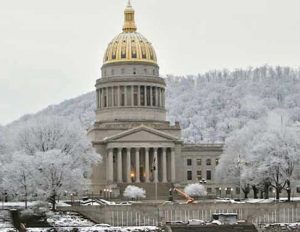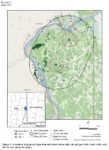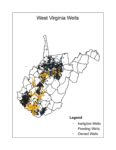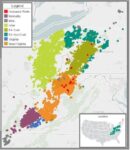Legislation to have the property rights of surface owners recognized, to increase their chances of owning some of the minerals under them, and to deal with thousands and thousands of orphaned wells and other environmental problems, will continue to be WV-SORO’s legislative priorities for 2020. Contact us and tell us which is more important to you and why!
We will also be active opposing legislation the industry introduces (out of its sense of entitlement) which will harm the interests of surface owners (including some fortunate few of whom are also small mineral interest owners).
Some think that the recent election results will hurt our chances on those fronts. We disagree. WVSORO has always tried to be non-partisan. Rural Republican legislators have generally been supporters of our positions. Our issues are in essence property rights issues favored by many of those just elected.
Most of our successes in the past are as a result of the actions of the members of WVSORO back home being heard by their legislators. Keep reading to learn more about our legislative priorities, and feel free to start contacting your legislators now. And we will send alerts on legislation we are proposing once we have actual bill numbers.
Here are the legislative priorities:
- Orphaned Wells Plugging Money: Pass Three Bills to Begin to Fund Plugging of Existing Orphaned Wells.
- Orphaned Well Prevention: Pass Another Bill to Prevent Thousands and Thousands More Wells from Becoming Orphaned.
- Protect Surface Owners: Pass a Bill to Implement the Recommendations of the WVU Studies Required by the 2011 Horizontal Well Act.
- Land Reunion: Pass a Bill to Let Surface Owners Step into the Shoes of the High Bidder If an Interest In Their Minerals Is Sold at a Tax Sale
- Pipelines: Pass a Bill to Require Compensation Paid to Landowners in Eminent Domain Proceedings for Pipelines to Be Based on Its Value/Worth to the Pipeline Company
I.Pass Three Bills to Begin to Plug Oil and Gas Wells Orphaned and Left Behind with No One Who Benefited from the Well Around to Plug Them.
There is an “Oil and Gas Reclamation Fund” to plug the 4,500 oil and gas wells that have been orphaned over the last century by oil and gas drillers who go out of business without plugging them. From 2010 to 2014 there was only enough money in the fund to plug just 6. The tsunami of horizontal drilling into the Marcellus Shale and other formations will cause lots more conventional drilling companies to go out of business without plugging their wells. Worse than that, EQT and some of the other big producers have been selling their conventional wells to a company called Diversified Gas and Oil and it subsidiaries. Diversified is an Alabama Company getting funding to purchase these wells on a British stock exchange by bragging that they will make money on them for 15 years, but their own published plugging program shows that at the end of the fifteen years when their wells are no longer making money, 50,000 of its wells across Appalachia will still be unplugged.
Three bills that would have begun plugging orphaned wells were alive the last night of the 2019 Legislative Session, but ultimately failed. We think we can get them passed next year with your help. The first bill was a WVSORO initiated bill. The Marcellus Shale tsunami has resulted in lots of money being held by special receivers for heirs who cannot be found in partition and missing lessor suits. The second bill is a bill pushed by the Independent Oil and Gas Association who, as a result of our pressure, puts part of their tax cuts instead towards plugging orphaned wells. The third bill is pushed by the West Virginia Oil and Natural Gas Association and it lets them pay extra for extradited permits processing and, because of our pressure, puts some of that money toward plugging orphaned wells.
- WVSORO web page on orphaned wells with a link to an article explaining the problem and the three plugging money bills; plus a web page explaining why the bills died and why we think we can get the passed next year.
II.Pass a Bill to Prevent Thousands and Thousands More Oil and Gas Wells from Becoming Orphaned
We expect 10,000 more wells to become orphaned unless new laws are passed. Current blanket bonding of wells allows bigger drillers bonds to be less than $25 a well! We need legislation to require drillers to set aside money in the treasurer’s office while the well is making money to plug the wells when they need plugged (or a similar idea). IN ADDITION, and we need a way to make sure that drillers who have the money to plug wells cannot transfer them to drillers who do not have the money to plug wells. Fact Sheet on what happens now/why this is necessary
- WVSORO web page on orphaned wells with a link to an article explaining the problem and the transfer bill.
III. Pass a Bill to Implement the Recommendations of the WVU Studies Required by the 2011 Horizontal Well Act
When the Horizontal Well Act was passed in a three day special session in December 2011, surface owners did not get many protections. Instead the Act required studies on the impacts on surface owners to be done, and safeguards were supposed to be enacted if the studies showed the need. The studies showed, according to the DEP, that safeguards needed implemented “to reduce potential exposures” and” to provide for a more consistent and protective safeguard for residents in affected areas.” The safeguards were never implemented.
- Bullet points regarding implementation of the WVU studies
- WV-SORO’s position paper which references this appendix from the actual studies
- Summary of DEP’s non-response to the studies with links to the studies (below “About the Horizontal Well Control Act”)
- Bill introduced during the 2017 legislative session (HB 2990) for fence line/continuous monitoring of air, noise, dust, and particulates
IV. Land Reunion. Pass a Bill to Let Surface Owners Step into the Shoes of the High Bidder If an Interest In Their Minerals Is Sold at a Tax Sale.
Ownership of the surface and ownership of the minerals should never have been separated. Almost everyone agrees. WVSORO thinks there should be a “West Virginia Land Reunion”. We have even recorded a song about it for you to listen to!
We think the Legislature should pass a bill to allow surface owners to get back any of their minerals that are sold at tax sales.
- Brief bullet points telling what the tax sale problem is and what can be done about it
- What opponents of the bill have said to try to stop the bill and what we say back
- An article from the State Journal on the situation of one unlucky citizen/surface owner who could have been helped if the bill had already passed
- Version that passed the WV Senate during the 2017 legislative session (SB 369)
- And don’t forget to listen to “The West Virginia Land Reunion Song”
V. Pass a Bill to Require Compensation Paid to Landowners in Eminent Domain Proceeding for Pipelines to Be Based on Its Value/Worth to the Pipeline Company
The rights of way for the various interstate pipeline projects will not be owned by the state, but by a private for-profit company. Most of the gas will be used not by local homeowners, or even by local businesses. Much of the gas will be used by for-profit private enterprise businesses or, at best, by privately owned electric utility companies with regulated, guaranteed profits. Billions and billions of dollars worth of gas will pass through the pipelines.
So if the farmers are to have unwanted pipelines placed across their land, they should not be given the low price of what the pasture was worth to the farmer as a pasture. They should be given what the value of having the pipeline across the farmer’s land is worth to the pipeline company and their gas buyers.
The Legislature should pass a bill that would change the determination of “just compensation” to be paid to landowners when eminent domain is used for a pipeline and the pipeline does not connect to a residential or commercial end user. This would allow property owners to share financially in the gains from the various interstate pipeline projects, if they are approved and built.











